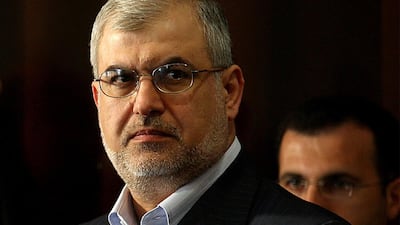Live updates: Follow the latest news on Israel-Gaza
The son of a top Hezbollah politician and member of parliament was one of five of the group's fighters killed in an Israeli air strike on the village of Beit Yahoun in south Lebanon, it was announced on Thursday.
MP Mohammad Raad said his son Abbas’s death “has honoured us, just as he has honoured the families of every martyr”.
“If I am at all angry it’s because he preceded me [in martyrdom]. He was better and faster than me,” Mr Raad said. “We remain steadfast on the front.”
Mourners threw roses at Mr Raad and congratulated him as he viewed his son’s casket.
Mr Raad is the head of Hezbollah’s parliamentary wing sanctioned by the US in 2019. He is a leading figure in the Iran-backed group and a member of its executive committee.
The Israeli military said that its fighter jets struck Hezbollah infrastructure in Lebanon, hitting two cells that fired at troops or tried to launch rockets.
Fighting between Israel and Hezbollah has continued to intensify at the border despite the declaration of a truce in Gaza, which was set to begin on Thursday morning but has now been delayed.
It remains to be seen whether fighting along the border will calm following the implementation of the pause in Gaza.
Hezbollah has been supporting its ally Hamas in Gaza by waging a war of attrition with Israel since October 8. Both sides have held back from a full-scale war that could have devastating consequences on both Lebanon and Israel, given Hezbollah's arsenal, which reportedly includes tens of thousands of rockets and missiles.
A well-placed Hezbollah source previously told The National that clashes on the Israeli-Lebanese border would calm only if Israel respected the rules of Gaza’s truce and if attacks on Lebanon did not continue.
The group announced the death of a sixth fighter on Thursday morning, bringing the total killed since violence broke out along the border to 86.
Largest rocket barrage on northern Israel
Hezbollah on Thursday claimed responsibility for what Israeli media described as the largest rocket barrage on the border since the conflict between Israel and Hezbollah began.
The Iran-backed group said it had fired 48 Katyusha rockets into Israel on Thursday morning, targeting the Ein Zeitem base near Safad city in northern Israel.
The Israeli army said it had identified approximately 35 rockets.
It was an apparent response to Israel's killing of five Hezbollah fighters in Beit Yahoun, which is about 6km from the border with Israel. The rocket barrage targeted an Israeli military base in Ein Zeitem – also 6km from the frontier.
The group also said it had attacked Israeli soldiers operating in several areas near the border, leading to “deaths and casualties”.
The Israeli military does not immediately provide updates on casualties but said in a statement it retaliated by striking a “number of launchers from which projectiles were fired”.


